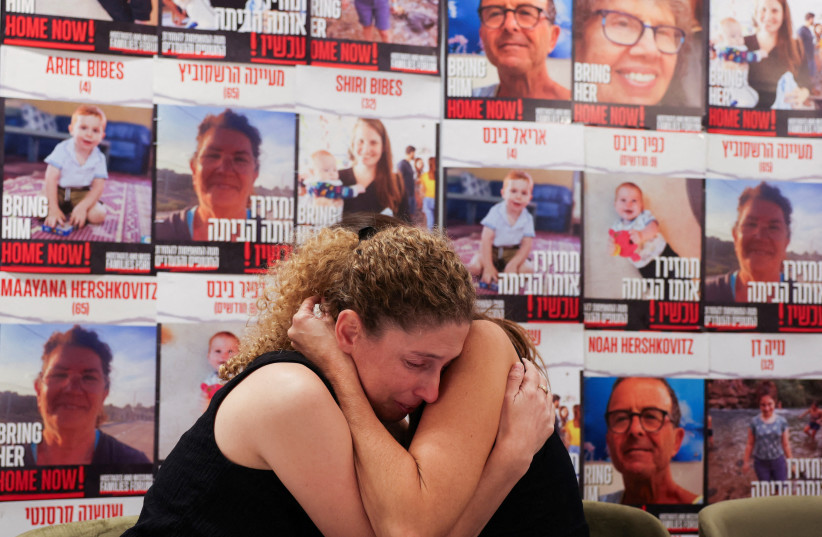Since October 7, I’ve noticed that I’m no longer alone in being troubled by these three simple words: “How are you?” While it is a comfort to have company in my mental ruminations and terminology struggles which predate October 7, I would rather have stayed solitarily marooned on my linguistic island if it could have meant undoing that fateful black day which brought horror and tragedy, grief and depression, and a seismic shift in our perception of our Israeli lives and of a world that (still) vocally shows itself more against than for our people.
In the days and first weeks after October 7 this string of three small words would elicit responses by others such as: “How can I really be?” or, “I’m as well as every other Jewish Israeli,” or more recently, as journalist and presenter Sivan Rahav-Meir quoted Rabbi Yoram Eliyahu whose son Yedidya fell in Gaza: “Learning. We are learning.” Indeed, we are the hardest lessons of life, which we can endeavor to apply in an uncertain future to strengthen rather than weaken us.
But even before our nation was deeply thrust into this war which we didn’t ask for, and being a person who takes things literally – if a question is asked, the person posing it must want an answer – these seemingly innocent words would plunge me into a dilemma of how to respond; was this ubiquitous query a mere harmless if empty nicety, or did it voice genuine interest in details of well-being?
I also wondered if the three-word questioner was looking for a matching-length reply, perhaps like: “Fine, all good,” or, “The dog disappeared,” or maybe, “Washer just flooded.” How honest is it appropriate and socially acceptable to be?
And how totally unfair, that three short words often dispensed unthinkingly, if answered seriously may need a reply of 33 words, or 333 words (about the number in this piece so far), or more. Who would be interested in a long honest response in our speeding universe?

The once rapid-fire door-stop comments of the powerful have made way to Tweets and 15-second TikTok content, all catering to the short attention span. I can imagine an overloaded listener silently moaning about TMI, the acronym for too much information I first learned of when my better half was told by his doctor of the complicated medical procedure he was about to undergo and promptly felt faint, whereupon the nurse quickly diagnosed the cause as TMI.
Cultural pressure to conceal negative emotions
In the 2017 New York Times bestseller Option B by Sheryl Sandberg (Board member and former COO of Facebook), and psychologist Adam Grant, written after the sudden death of Sandberg’s 48-year old husband and father of their two young children, she shares that when friends asked, “How are you?” she took it as more of a standard greeting than a genuine question. She wanted to scream back, “My husband just died, how do you think I am?”
Sandberg teases out the cultural pressure to conceal negative emotions and cites psychologist David Caruso who observes that American culture dictates that the answer to this misleadingly uncomplicated but hardly straightforward question should be not just “Good,” but “Awesome,” in a relentless drive to mask the expression of true feelings, such that admitting you’re having a hard time is almost inappropriate.
This reminds me of a close doctor friend who to every “How are you?” directed his way used to answer, “Fantastic,” even up to his last living day. His positivity was a beacon, but we probably never knew how he really was, which on one level may have deprived both him and those dear to him of purposeful conversation and closeness when the going got tough.
Sandberg suggests that when the questioner knows something out of the ordinary has happened to another, the better question to ask is, “How are you today?” which shows an awareness of challenging or difficult times. I recently thought about the benefit of thus narrowing and focusing the question when my dentist started our appointment with a how-are-you, and when she must have noticed my frustrated floundering as the words washed over me, she thoughtfully reframed her question, “How are your teeth?” Perfect (the question, not my teeth).
And in my experience it’s often preferable to not even pose the open-ended general question. For example, at times of ill health or other concerns in the life of another, an expression of support and realistic sincere wishes that don’t require a response but let the other know you’re thinking of them is a less demanding and more thoughtful approach.
Of course, everyday life is typically not as charged and dramatic as we’ve lately painfully witnessed. Still, when called upon to do so, how deeply should we reach to answer this question while truthfully reflecting our daily pulse?
It depends in part on who’s asking, but keeping it short and sweet will satisfy most and those who seek to know more will surely ask. Yet, if our sensitive intangible feelers that can pick up another’s level of true interest are activated, sharing more than less can be a mutually greatly rewarding experience.
I’m not immune from habitually also throwing out the three small words as conversation openers, before pulling in my tongue to stop giving shape to talk that often disguises lack of true intent.
And when these words spoken by another hang in the air, sometimes they can be politely ignored and we can move the conversation in another direction, usually with no adverse effects and no further imprecise vague questions asked.
The writer was a litigation lawyer in Melbourne, Australia before making aliyah with her husband in 2015 to join their adult children in Jerusalem. She writes and reads for pleasure and emotional sustenance.
